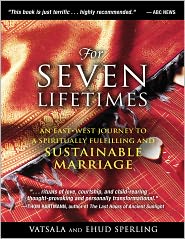
Defying the norms of her culture and tradition, a highly educated Tamil Brahmin woman decides to arrange her own marriage. Simultaneously, an American book publisher—disillusioned with love in the Western world—looks to India to find a wife by placing an ad in an Indian newspaper. A dialogue between two souls, two families, and two cultures, For Seven Lifetimes chronicles the year-long written courtship of this pair as they share their beliefs on sexuality, desire, gender roles, careers, parenthood, spirituality, and religion. By appreciating the similarities and differences in their orldviews, they initiate a union that reflects their ideals as a couple and the life they will create together. Revealing the secrets to a fulfilling relationship based on shared values and spiritual growth, Vatsala and Ehud outline the principles needed to truly understand the roles of husband and wife and the questions to ask to recognize true spiritual compatibility. With new chapters on the 15 years since their wedding day, stories of happy marriages inspired by and modeled on the book, marital “obedience,” and how a couple can become an engine for higher spiritual experiences, this new edition shows how the successful marriage reflects the greater union between the masculine and the feminine.
~ from the publisher's materials
The above description is far better than anything I could create, so I thought I'd let that stand and just get on with my opinion.
We are fortunate in that both Vatsala and Ehud are good writers, their correspondance is a pleasure to read, although at times I felt it was too intimate. Their letters explore many important topics, allowing them to get to know one another at the most important levels and creating a foundation of mutual understanding. Perhaps it was because they knew they were creating a 'mixed' (religious and cultural) marriage, but I wish every "I want to get married" person would take the time to have this deep a conversation with the person they want to be marry. As Vatsala says, "I am very happy about the fact that we spent almost one full year writing to each other . . . we visited every topic that potentially could be a land mine . . . I was spared doing detective work and discovering uncomfortable truths. (p. 279)"
The letters are not what many of us think of as love letters. They are far more like a conversation between two people discussing themsleves as complete individuals with well-formed thoughts and feelings about many topics. These are two adults, with personal histories and experience. In many ways, it is extraordinary that they were comfortable sharing so much, so deeply. I found the letters that were more mundane as fascinating as the ones where they explored 'the big topics'. For example, Vatsala's experience of running through the rain during monsoon season or Ehud's tales of walking his dog Noogie.
This is lovely and romantic (don't we always like stories of people coming [and staying] together?) but it is not what makes For Seven Lifetimes a book I would recommend highly. It is the part where they talk about what happened after their marriage, now at 15+ years. Their letters were first published in 2000 (A Marriage Made in Heaven: How to Find and Keep A Spiritually Satisfying Relationship), and several things were highly controversial.
Mainly, one of Ehud's letters includes a list of Dos and Don'ts: "Do: Love, honor, and obey your husband and accord him his rightful place as head of household. Don't: Challenge, criticize, contradict, and ridicule him. Do: Expect your husband to put you and family before his own interests. Don't: Be demanding." Obviously, the word obey was one controversial topic, the other was the admonision to not challenge or criticize. Vatsala does a good job of explaining how those words were taken out of context, and that 'obey' isn't a mindless situation and not challenging or criticizing doesn't mean to not share your opinion. Expressing your opinion can be done, should be done, but doesn'ty have to be done by putting the other down or in some argumentative way. Moreover, Ehud's list seems to not be read in its entirety; he says explicitly that he will place her and his family above his own interests, doesn't that reduce the likelihood of needing to disobey him?
Ehud clarifies that he would of course fully respect and honor his wife's feelings, thoughts, and wishes, always welcoming her input. He says in one letter, "Ultimately, the marriage should reflect the spiritual ideals of that greater marriage between the masculine and the feminine. The man must worship the goddess in his wife and conversely the wife must see her husband as her god. We are just reflections of the beloved, striving in our imperfect way for union and liberation. Marriage should be the foundation that helps us achieve those goals."
Moreover, I would point out that these Dos and Don'ts are not tied to gender, if the Head of Household is a woman, why wouldn't the list apply to her (and her spouse) as well . . . or to a household where the couple is the same gender?
In the end, I found For Seven Lifetimes to be an extraordinary account of an unusual couple who are making it work despite wildly disparate backgrounds. Fifteen years means a lot in this day and age of 50% divorce rate, perhaps they have something to offer you?
~review by Lisa Mc Sherry
Authors: Vatsala and Ehud Sperling
Inner Traditions, 2010
pp. 352, $19.95
